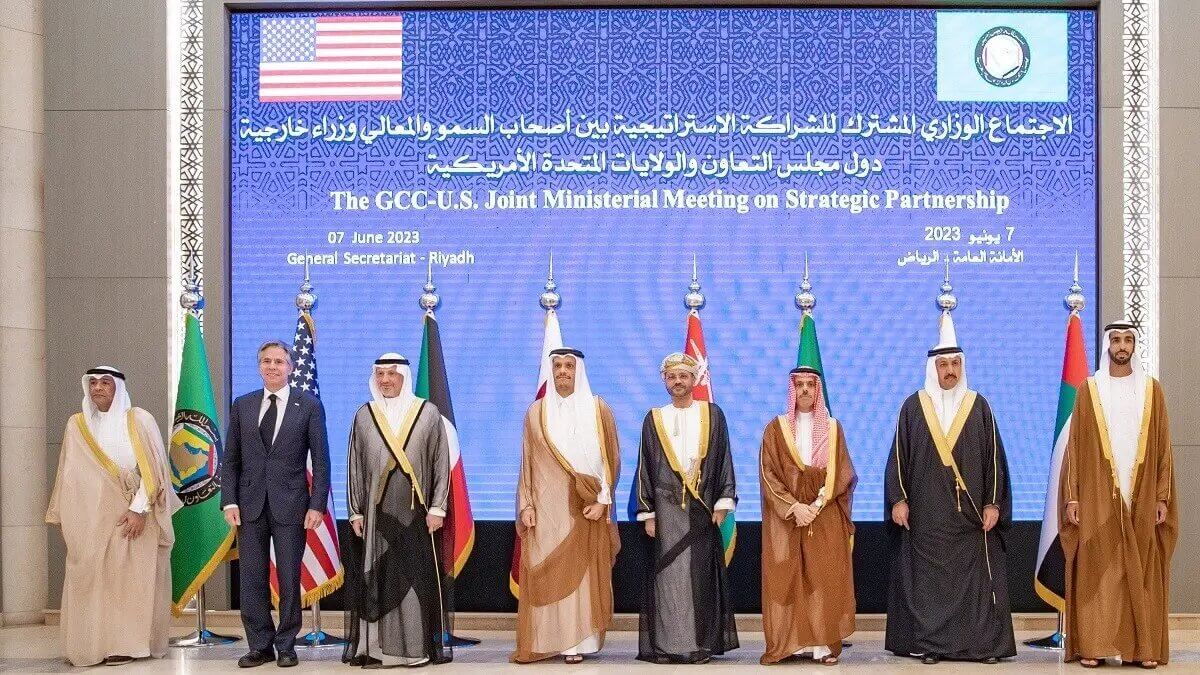The US and the Gulf Cooperation Council (GCC) released a joint statement on ensuring regional political and economic stability after a meeting in Riyadh on Thursday. The statement was issued after US Secretary of State Antony Blinken attended a GCC meeting as part of his visit to Saudi Arabia this week.
Overview
The GCC-US Joint Ministerial Meeting on Strategic Partnership was attended by Blinken and foreign ministers (FMs) from GCC nations, including Prince Faisal bin Farhan, Minister of Foreign Affairs for the Kingdom. The FMs emphasised the need to maintain cooperation between the different sides to facilitate regional security, prosperity, and a flourishing economy.
In the joint statement, they highlighted the strategic, ambitious, and increasing ties between the US and the GCC to promote peace, security, stability, integration, and prosperity in the Middle East.
The US reaffirmed its “enduring commitment” to the Gulf region in the statement, despite concerns about its declining influence in the Middle East in an increasingly multipolar world in which Washington has redirected its foreign-policy focus on competition with China.
The ministers stressed the importance of combating terrorism and violent extremism worldwide and welcomed the Global Coalition to Defeat ISIS ministerial meeting in Riyadh.
We appreciate the Gulf Cooperation Council @GCC’s partnership, including our urgent work together on the situation in Sudan, seeking a durable solution to the conflict in Yemen, and countering Iran’s destabilizing behavior. pic.twitter.com/xaGQvV6HK3
— Secretary Antony Blinken (@SecBlinken) June 7, 2023
Key Points on Global Challenges Affecting the Gulf States:
Iran
The GCC and the US assured their commitment to regional maritime security and freedom of navigation, and combat illegal activities at sea that might threaten shipping lanes, international trade, and oil installations in the GCC.
The FMs affirmed their commitment to the Treaty on the Non-Proliferation of Nuclear Weapons and asked Iran to work fully with the International Atomic Energy Agency.
They also hailed Saudi Arabia and Iran’s decision to re-establish diplomatic ties and emphasised the necessity of regional powers adhering to international laws like the UN Charter.
#BREAKING: The #GCC-#US joint statement welcome the resumption of diplomatic relations between #SaudiArabia and #Iran pic.twitter.com/iZxRquEnGj
— Saudi Gazette (@Saudi_Gazette) June 8, 2023
Israeli-Palestinian Struggle
The joint statement advocates for a two-state solution to the Israeli-Palestinian conflict “along 1967 borders with mutually agreed swaps consistent with internationally recognised parameters and the Arab Peace Initiative.” These provisions would establish a Palestinian state in Gaza and the West Bank, including occupied East Jerusalem.
The Ministers also underlined the importance of supporting the Palestinian Authority and improving Palestinians’ daily lives, especially through humanitarian assistance and measures to strengthen the Palestinian economy. The Ministers expressed their continued support for the Palestinian Authority.
Yemen
The FMs reiterated the importance of the ongoing UN-led peace initiative in Yemen following the April 2022 agreement, and the subsequent calm. They praised the efforts of Saudi Arabia, Oman, and UN and US envoys.
In the statement, they also expressed optimism for an inclusive Yemeni-Yemeni political process that results in a lasting end to the conflict, complies with Yemenis’ hopes for justice, accountability, and redress for human rights violations and abuses, and places the nation on a path to recovery.
Syria
The FMs also reaffirmed their commitment to resolving the Syrian crisis in an approach that preserves “Syria’s unity and sovereignty, meets the aspirations of its people, is consistent with international humanitarian law, and is consistent with UN Security Council Resolution 2254 (2015).”
They stressed the need to establish secure conditions for the safe, dignified, and voluntary return of refugees and internally displaced people per UNHCR standards and provide essential support to Syrian refugees and the countries that host them.
The FMs reiterated their appeal for a national cease-fire, and applauded the UN Secretary General’s call for a 12-month extension of the Security Council’s authorisation to operate the cross-border mechanism.
Welcome the GCC Foreign Ministers' support for a 12-month renewal of the UN's cross-border mechanism in Syria – one that ensures all current border crossing points remain open.
— Ambassador Linda Thomas-Greenfield (@USAmbUN) June 8, 2023
The Security Council must sustain these essential lifelines for the Syrian people.…
Iraq
The Ministers discussed the importance of civilian-led efforts, such as economic reforms to ensure that Iraq’s people benefit from the country’s natural resources, stabilisation to ensure communities can recover from conflict and Daesh violence, measures to deter terrorism financing, and efforts to counter Daesh narratives, all of which complement ongoing work to strengthen the Iraqi government’s counterterrorism capabilities.
War in Ukraine
Regarding the Ukraine conflict, the FMs reiterated the significance of respecting the principle of sovereignty and international law, especially the UN Charter, and the need to refrain from threatening or using force against any state’s territorial integrity or political independence.
They stressed the need to assist refugees, displaced people, and those affected by the Ukraine conflict and facilitate the export of grain and other food supplies to ensure food security in affected nations.
For the growth of GCC-US Strategic Partnership, the FMs reaffirmed their commitment to working together within the established framework to promote regional security and stability. They agreed to meet later this year to discuss the GCC-US cyber security working group.
The FMs also emphasised the need to host periodic working groups to discuss defence issues, and pledged to hold another round of GCC-US integrated air and missile defence and marine security working groups later this year.

